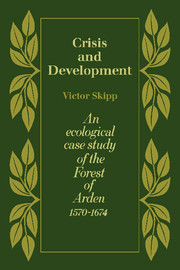Book contents
- Frontmatter
- Contents
- List of figures
- List of tables
- Acknowledgements
- PART ONE THE CONTEXT
- PART TWO THE CASE STUDY
- PART THREE IMPLICATIONS
- 12 General propositions
- 13 The ‘General European Crisis’
- 14 The Civil War alignment
- Appendix 1 The practice of birth control
- Appendix II Estimates of population size
- Notes
- Index
13 - The ‘General European Crisis’
Published online by Cambridge University Press: 05 November 2011
- Frontmatter
- Contents
- List of figures
- List of tables
- Acknowledgements
- PART ONE THE CONTEXT
- PART TWO THE CASE STUDY
- PART THREE IMPLICATIONS
- 12 General propositions
- 13 The ‘General European Crisis’
- 14 The Civil War alignment
- Appendix 1 The practice of birth control
- Appendix II Estimates of population size
- Notes
- Index
Summary
It was as long ago as 19 54 that E. J. Hobsbawm first advanced the concept of a general European crisis in the seventeenth century: a crisis which, ‘in view of the wide variation of the periods of maximum disturbance in different parts of Europe’, he has since suggested might well be taken as having persisted in some countries down to 1720. While admitting that an explanation which would meet with general agreement still remains to be found', Professor Hobsbawm himself views this crisis as essentially economic, believing that it will eventually be seen ‘to fit most readily into some elaborated or modified version of the Marxist model of economic development’. In 1960 H. R. Trevor-Roper advanced a rival hypothesis, namely that the general seventeenth-century crisis was first and foremost of a political nature: ‘a crisis not of the constitution nor of the system of production, but of the State, or rather, of the relation of the State to society’. It was left to French historians to emphasize ‘the number of bad harvests, of subsistence crises, of famines, of plagues’; and to infer from the widespread occurrence of such phenomena that both ‘the long series of cumulative economic crises’ and the ‘series of political revolutions’ may have been underlain by a much more fundamental, albeit elusive, malady: namely, an endemic Malthusian imbalance between population and resources.
- Type
- Chapter
- Information
- Crisis and DevelopmentAn Ecological Case Study of the Forest of Arden 1570–1674, pp. 99 - 101Publisher: Cambridge University PressPrint publication year: 1978



